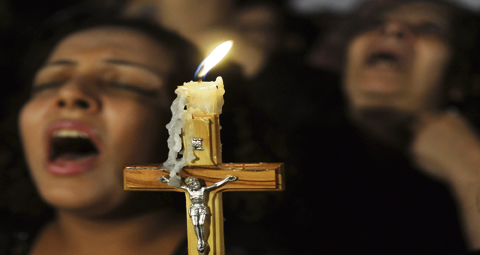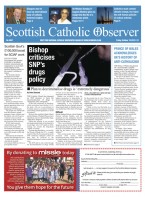May 15 | ![]() 0 COMMENTS
0 COMMENTS ![]() print
print

Move closer towards the light of God
Fr Ronald Rolheiser
What’s the use of an old-fashioned, hand-held lantern? Well, its light can be quite useful when it is pitch-dark, but it becomes superfluous and unnoticeable in the noonday sun. Still, this doesn’t mean its light is bad, only that it is weak.
If we hold that image in our minds, we will see both a huge irony and a profound lesson in the Gospels when they describe the arrest of Jesus. The Gospel of John, for example, describes His arrest this way: “Judas brought the cohort to this place together with guards sent by the chief priests and Pharisees, all carrying lanterns and torches.” John wants us to see the irony in this, that is, the forces of this world have come to arrest and put on trial, Jesus, the Light of the world,
carrying weak, artificial light, a lantern in the face of the Light of the world, puny light in the full face of the noonday sun. As well, in naming this irony, the Gospels are offering a second lesson: when we no longer walk in the light of Christ, we will invariably turn to artificial light.
This image, I believe, can serve as a penetrating metaphor for how the
criticism that the Enlightenment has made of our Christian belief in God stands before what it is criticising. That criticism has two prongs.
The first prong is this: The Enlightenment (Modernist Thought) submits that the God that is generally presented by our Christian churches has no credibility because that God is simply a projection of human desire, a god made in our own image and likeness, and a god that we can forever manipulate to serve self-interest. Belief in such a god, they say, is adolescent in that it is predicated on a certain naiveté, on an intellectual blindness that can be flushed out and remedied by a hard look at reality. An enlightened mind, it is asserted, sees belief in God as self-interest and as intellectual blindness.
There is much to be said, positively, for this criticism, given that much of atheism is a parasite off of bad theism. Atheism feeds off bad religion and, no doubt, many of the things we do in the name of religion are done out of self-interest and intellectual blindness. How many times, for instance, has politics used religion for its own ends? The first prong of the criticism that the Enlightenment makes of Christian belief is a healthy challenge to us as believers.
But it is the second prong of this criticism that, I believe, stands like a lantern, a weak light, dwarfed in
the noonday sun. Central to the
Enlightenment’s criticism of belief in God is their assertion—perhaps better called prejudice—that faith is a naiveté, something like belief in Santa and the Easter Bunny, that we outgrow as we mature and open our minds more and more to knowledge and what is empirically evident in the world. What we see through science and honest observation, they believe, eventually puts to death our belief in God, exposing it as a naiveté. In essence, the assertion is that if you face up to the hard empirical facts of reality without blinking, with honesty and courage, you will cease to believe in God. Indeed, the very phrase ‘the Enlightenment’ implies this. It’s only the unenlightened, pre-modernist mind that still can believe in God. Moving beyond belief in God is enlightenment.
Sadly, Christianity has often internalised this prejudice and expressed it—and continues to express it—in the many forms of fear and anti-intellectualism within our churches. Too often we unwittingly agree with our critics that faith is a naiveté. We do it by believing the very thing our critics assert, namely, that if we studied and looked at things hard enough we would eventually lose our faith. We betray this in our fear of the intellectual academy, in our paranoia about secular wisdom, in some of our fears about scientific knowledge, and by forever warning people to protect themselves against certain inconvenient truths within scientific and secular knowledge. In doing this, we, in fact, concede that the criticism made against us is true and, worse still, we betray that fact that we do not think that the truth of Christ will stand up to the world.
But, given the penetrating metaphor highlighted in Jesus’ arrest, there’s another way of seeing this: After we have conceded the truth of the legitimate findings of science and secular wisdom and affirmed that they need to be embraced and not defended against, then, in the light of John’s metaphor—worldly forces, carrying lanterns and torches, as they to arrest the Light of world to put it on trial—we should also see how dim are the lights of our world, not least, the criticism of the Enlightenment.
Lanterns and torches are helpful when the sun is down, but they’re utterly eclipsed by the light of the sun. Worldly knowledge too is helpful in its own way, but it is more-than dwarfed by the light of the Son.
— Fr Ronald Rolheiser is a priest and member of the Missionary Oblates of Mary Immaculate. He is president of the Oblate School of Theology in San Antonio, Texas. Visit his website at www.ronrolheiser.com










